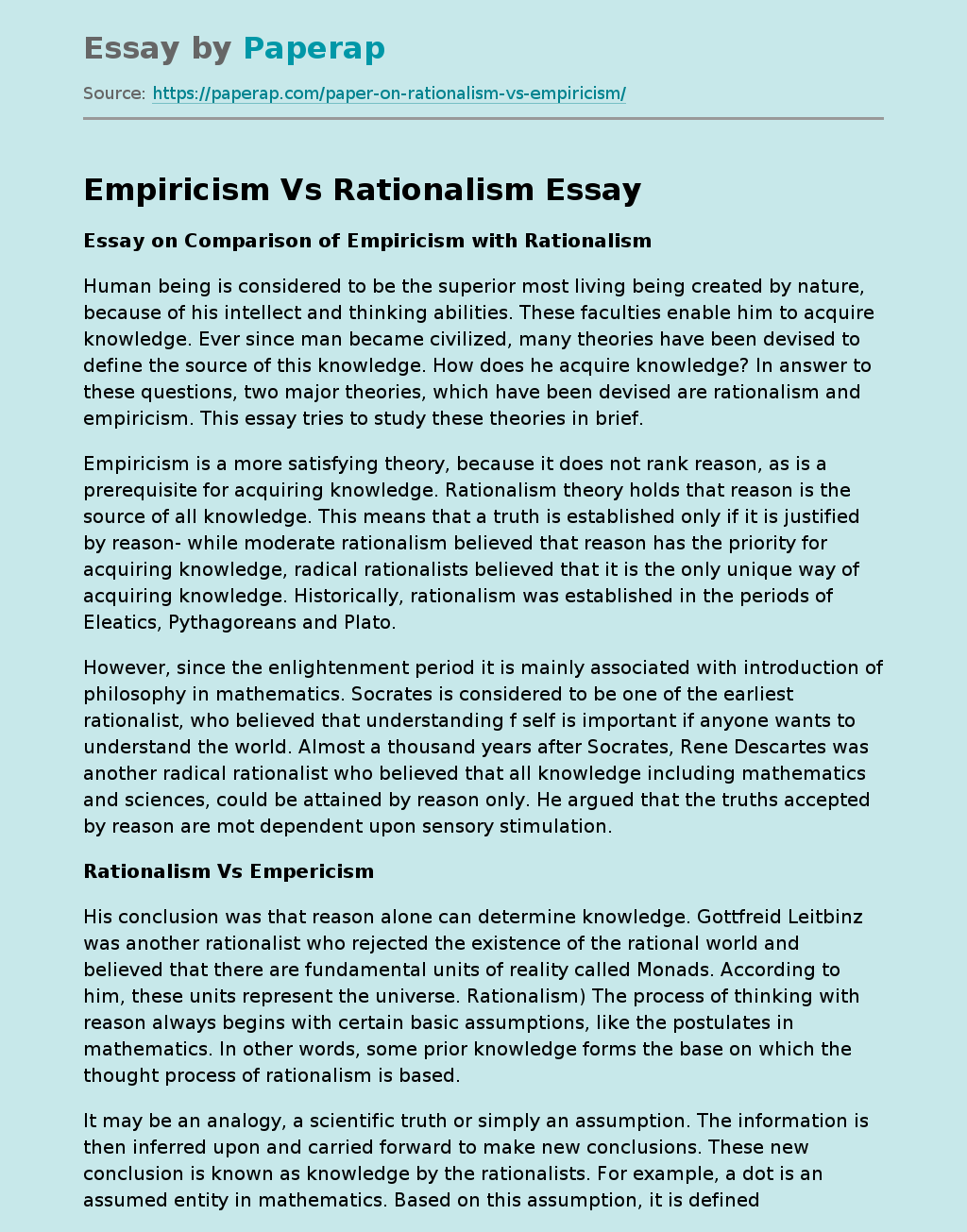Empiricism Vs Rationalism
Essay on Comparison of Empiricism with Rationalism
Human being is considered to be the superior most living being created by nature, because of his intellect and thinking abilities. These faculties enable him to acquire knowledge. Ever since man became civilized, many theories have been devised to define the source of this knowledge. How does he acquire knowledge? In answer to these questions, two major theories, which have been devised are rationalism and empiricism. This essay tries to study these theories in brief.
Empiricism is a more satisfying theory, because it does not rank reason, as is a prerequisite for acquiring knowledge. Rationalism theory holds that reason is the source of all knowledge. This means that a truth is established only if it is justified by reason- while moderate rationalism believed that reason has the priority for acquiring knowledge, radical rationalists believed that it is the only unique way of acquiring knowledge. Historically, rationalism was established in the periods of Eleatics, Pythagoreans and Plato.
However, since the enlightenment period it is mainly associated with introduction of philosophy in mathematics. Socrates is considered to be one of the earliest rationalist, who believed that understanding f self is important if anyone wants to understand the world. Almost a thousand years after Socrates, Rene Descartes was another radical rationalist who believed that all knowledge including mathematics and sciences, could be attained by reason only. He argued that the truths accepted by reason are mot dependent upon sensory stimulation.
Rationalism Vs Empericism
His conclusion was that reason alone can determine knowledge.
Gottfreid Leitbinz was another rationalist who rejected the existence of the rational world and believed that there are fundamental units of reality called Monads. According to him, these units represent the universe. Rationalism) The process of thinking with reason always begins with certain basic assumptions, like the postulates in mathematics. In other words, some prior knowledge forms the base on which the thought process of rationalism is based.
It may be an analogy, a scientific truth or simply an assumption. The information is then inferred upon and carried forward to make new conclusions. These new conclusion is known as knowledge by the rationalists. For example, a dot is an assumed entity in mathematics. Based on this assumption, it is defined that when many dots are joined, a straight line is formed. Empiricism on the other hand believes that acquisition of knowledge is based on experience, and sensory perceptions. Its origins date back to the ancient Greeks, who relied on observations.
Its doctrine was first formulated by John Locke, in the 17th century. The basic theory of empiricism is that knowledge can be acquired through experiences only. In a broader sense, the sensory perceptions arte categorized as experiences. Aristotle was one of the most prominent advocate of empiricism. He laid strong emphasis on the sensory perceptions of our body. This he called as ‘natural philosophy’, Later, the same was o become ‘inductive reasoning’, which derives conclusions based on sensory data. Stoics was another prominent philosopher who favored empiricism.
He emphasized that mind was a white paper and the sensory perceptions give birth to new ideas. In the medieval era, Thomas Acquinas formulated the famous axiom, based on Aristotle’s work, “ Nothing is in the intellect which was not first in the sense”. David Hume, a Scottish philosopher, f the 18th century divided the human knowledge in two segments: relation of ideas and matters of fact. He emphasized that all idea are erived from impressions registered on mind through sensory perceptions.
Hence ideas, to him, are faint copies of sensations. Empiricism ) Unlike rationalism, empiricism does not require any quantitative inputs, which are interpreted by the human mind. Sensory perceptions, even if not intended, are going to be registered on mind, and form a base for the way a human notions are built up. As Davis Hume pointed out, Beliefs form the basis of our habits and beliefs are burnout of the environmental to exposed to. (empiricism). Many examples can prove this. When a child grows up in an environment of Christian faith, he would see nothing wrong or unethical in killing a fish or a chicken, to fill his stomach.
On the other hand, a child brought up in Hindu faith, will never agree to such a killing, and could never eat such a dish, however relishing it may be. This is how environment is crucial to build up of mental set ups. Empiricism has a tendency to touch the sentiments and the feelings of a human being. It is not necessarily limited to the conventional thoughts of knowledge in form of mathematics, literature Science etc. To empiricism, the canvas of knowledge is much larger, nd includes the human feelings also.
The basic question underlying these theories is : why should reason take a center place? It does not seem necessary to ‘prove anything and everything’, to make it acceptable. Has anybody been able to prove the existence of soul? Is there any reason underlying this theory? Still, it is widely accepted as an undisputed fact by almost all the faiths on this world. Are studies on soul, not knowledge? Take another case. What is the reason for life to exist on this earth? No branch of knowledge ahs as yet ascertained the reason of why we are living. Still we live.
So, is knowledge about living beings not knowledge? In fact, a more acceptable definition of knowledge is the one defined by empiricism. It encompasses the total spectrum of human life, both materialistic and abstract, and is inclusive of the inner feelings and the sentiments, which rationalism does not. Conclusively, it can be said that it is not necessary to believe that knowledge can be acquired only if it has a reason. It has already been acceptable even otherwise, for the many centuries in past and will be acceptable for many centuries in future.
Empiricism Vs Rationalism. (2019, Dec 05). Retrieved from https://paperap.com/paper-on-rationalism-vs-empiricism/

